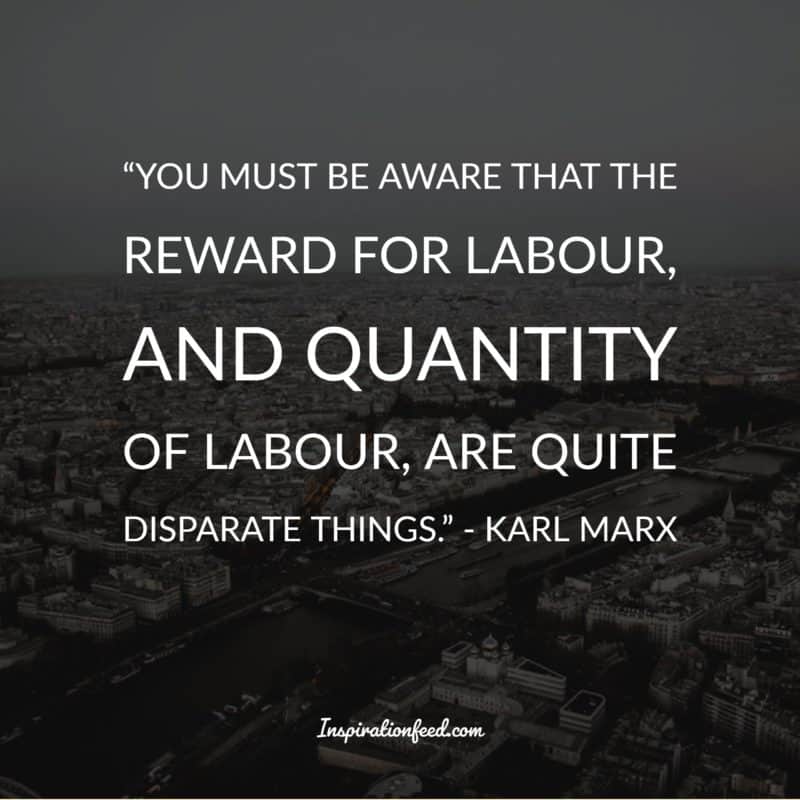Imagine a world where education is not a privilege reserved for the elite, but a powerful tool for liberation, a means to dismantle inequality and build a better society. This was the vision of Karl Marx, the revolutionary philosopher and economist whose ideas continue to resonate in debates about education today. Marx believed that education was not merely about acquiring knowledge, but about cultivating critical thinking, challenging societal norms, and fostering a sense of collective empowerment. This article delves into Marx’s revolutionary perspective on education, exploring his core tenets and their enduring relevance in shaping a more just and equitable world.

Image: inspirationfeed.com
Marx saw education as the cornerstone of human development and social progress. He believed that education had the potential to liberate individuals from the shackles of ignorance, prejudice, and the capitalist system that perpetuated inequality. His views on education were intricately intertwined with his broader theory of historical materialism, which argued that social and economic systems are shaped by material conditions and the struggle between classes. In this context, education, for Marx, was a means to empower the working class, the proletariat, and challenge the dominance of the ruling class, the bourgeoisie.
Unveiling the Marxist Vision: A Framework for Critical Thought
At the heart of Marx’s educational philosophy lies the concept of critical consciousness. He believed that education should cultivate a deep understanding of the social and economic forces that shape our lives, empowering individuals to critically analyze the power dynamics within society. This critical consciousness, he argued, would equip individuals with the tools to challenge oppressive structures and work towards a more equitable future.
Marx strongly advocated for universal and accessible education, believing that education should be available to all, regardless of their social background or economic status. He argued that a society in which only the privileged few have access to education perpetuates inequality and hinders social progress. For Marx, universal education was not simply about providing basic literacy but about equipping all members of society with the knowledge and skills they need to actively participate in shaping a better future.
Beyond the Classroom: Building a Revolutionary Society
Marx believed that education should be practical and relevant to the lives of students, preparing them to be active participants in society. He emphasized the importance of vocational training that would ensure students were equipped with the skills they needed to contribute meaningfully to the economy and the community. He envisioned a society in which education should not be confined to the classroom but should be integrated into all aspects of life, fostering a lifelong learning culture.
Marx emphasized the social and collective dimensions of learning. He argued that education should promote collaboration and teamwork, enabling individuals to learn from each other and build a sense of solidarity. He believed that the process of learning should not be limited to the exchange of information but should foster empathy, understanding, and a shared commitment to social justice.
Navigating the Contemporary Landscape: Legacy and Applications
Marx’s ideas about education remain strikingly relevant in a world marked by increasing inequality and global crises. His call for critical consciousness continues to resonate in educational movements that advocate for social justice, challenging biases and promoting critical thinking. His strong stance on universal access to education echoes in global initiatives that aim to provide quality education to all, regardless of their background or location.

Image: motivationalwizard.com
Expert Insights: Embracing Critical Pedagogy
Modern educators grappling with the challenges of contemporary education can draw inspiration from Marx’s legacy. Professor Paulo Freire, a renowned Brazilian educator, championed critical pedagogy, an approach that aligns with Marx’s vision of education as a tool for social transformation. Critical pedagogy emphasizes dialogue, reflection, and critical analysis of power structures, enabling learners to become agents of change and work towards a more just society.
Actionable Tips: Connecting Theory to Practice
Implementing Marx’s vision of an empowering and transformative education requires a paradigm shift in how we approach teaching and learning. Here are some actionable tips for educators and students:
- Foster critical thinking: Encourage students to question assumptions, analyze social issues, and challenge inequalities.
- Promote dialogue and collaboration: Create learning environments that value diverse perspectives and foster respectful communication.
- Engage with real-world issues: Connect classroom learning to relevant social and political issues, empowering students to develop solutions.
- Advocate for accessible education: Support initiatives that promote universal access to quality education for all.
Karl Marx On Education
Conclusion: A Legacy of Transformation
Marx’s legacy continues to shape the landscape of education today. His emphasis on critical consciousness, universal access, and social transformation serves as a powerful reminder that education is not merely about acquiring knowledge but about empowering individuals and communities to build a better future. As we navigate the complexities of the 21st century, embracing Marx’s vision of education as a force for social change can guide us in creating a world that is more just, equitable, and inclusive for all.





